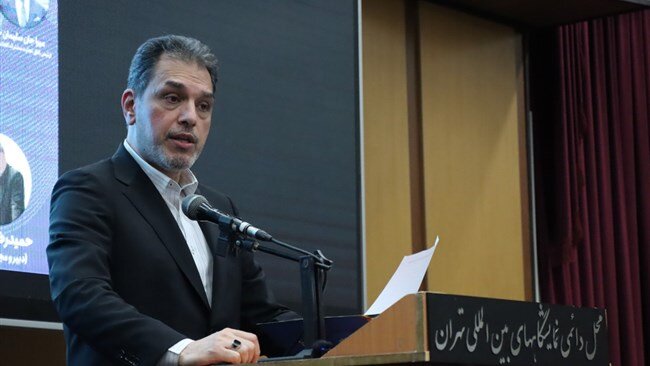Iran seeks strategic trade partnerships with Afghanistan to boost regional stability

TEHRAN - Strengthening economic cooperation between Iran and Afghanistan will contribute to regional stability and create a framework for sustainable partnerships, a senior Iranian trade official said on Sunday.
Payam Baqeri, deputy head of the Iran Chamber of Commerce, Industries, Mines and Agriculture (ICCIMA), made the comments at a conference on Iran-Afghanistan trade opportunities, emphasizing the Chamber’s commitment to laying the groundwork for enduring commercial ties between the two neighboring countries.
“Iran and Afghanistan can build a win-win partnership by leveraging their respective resources and capabilities,” Baqeri said. “Iran’s advanced industrial infrastructure and access to global markets, combined with Afghanistan’s mineral wealth, fertile land, and young labor force, make them natural economic partners.”
Baqeri highlighted the shared linguistic, cultural, and historical bonds between the two countries, describing them as a strong foundation for economic growth, trade expansion, and durable relations. He added that expanding bilateral trade would support stability in the region and benefit future generations.
“The outlook for Iran-Afghanistan trade is positive and promising,” he said, noting that official data indicates a significant increase in trade volume between the two countries in 2024.
The ICCIMA deputy head described the Chamber’s role as a proactive facilitator of trade relations and strategic partnerships. He said the Chamber is committed to resolving trade barriers through dialogue with governments and enhancing commercial interaction by expanding business networks and holding joint trade events.
He also voiced support for the creation of joint ventures across various economic sectors and said the Chamber was working with educational institutions to help train a skilled workforce in both countries.
“Iran’s private sector, with a forward-looking perspective, is ready to participate in Afghanistan’s infrastructure, mining, agriculture, energy, and engineering projects,” Baqeri said.
He called for Iran-Afghanistan relations to serve as a model for regional cooperation: “A partnership grounded in shared history and a vision for a better future can become a lasting and constructive alliance.”
In a meeting with officials from the Taliban-led government on April 30, Iranian Agriculture Minister Gholamreza Nouri Ghezeljeh said Iran is ready to export technical and engineering services in agriculture to Afghanistan.
The minister told Afghanistan’s deputy agriculture minister in the meeting that the necessary infrastructure and capacity exist to transfer agricultural expertise and know-how to Afghan professionals. He noted that Iran and Afghanistan share deep-rooted cultural and historical ties and continue to seek closer cooperation in various fields.
Nouri Ghezeljeh emphasized the need to establish a joint committee between Iran and Afghanistan, based in Kabul, to advance bilateral relations. “We must seriously pursue the expansion of ties between the two countries, particularly in agriculture,” he said, adding that cooperation agreements should be drafted and signed within the framework of the joint committee.
The Iranian minister stressed the importance of expanding economic and agricultural relations with Afghanistan, citing the sector's broad potential. He said forming the committee and signing memorandums of understanding would help strengthen mutual cooperation.
Meanwhile, Iran and Afghanistan held a joint technical meeting in Kabul, on April 10, to follow up on the implementation of a bilateral economic agreement, the Taliban-led Afghan government's Economic Affairs Office said in a statement.
According to IRNA’s correspondent in Kabul, the session took place at the Marmarin Palace and brought together representatives from both sides to review progress on commitments outlined in the Tehran-Kabul economic pact.
The meeting focused on expanding bilateral trade, resolving current transit-related challenges, facilitating trade processes, and fostering joint cooperation in modernizing Afghanistan’s agricultural sector. Officials also discussed implementing previous decisions in the transport sector, encouraging investment in Afghanistan’s mining industry, and streamlining customs procedures.
Both sides stressed the importance of continuing such meetings in the future to ensure full implementation of the agreement and to deepen economic ties between the two neighbors.
Recent data indicates a substantial increase in trade between Iran and Afghanistan. In 2024, the bilateral trade volume surged by approximately 84 percent compared to the previous year, reaching a total of $3.197 billion. Iran's exports to Afghanistan accounted for $3.143 billion of this figure, marking an 83 percent rise from 2023. Conversely, Afghanistan's exports to Iran grew by 116 percent, totaling $54 million.
Iran has become a primary supplier for Afghanistan, providing about 25 percent of the country's imports. Key Iranian exports include oil and refinery products, steel, agricultural goods, and construction materials. Afghanistan's exports to Iran mainly consist of raw materials and agricultural products.
This growing trade relationship underscores the deepening economic ties between the two nations, highlighting the importance of continued cooperation and dialogue to further enhance bilateral trade and investment opportunities.
EF/MA
Leave a Comment